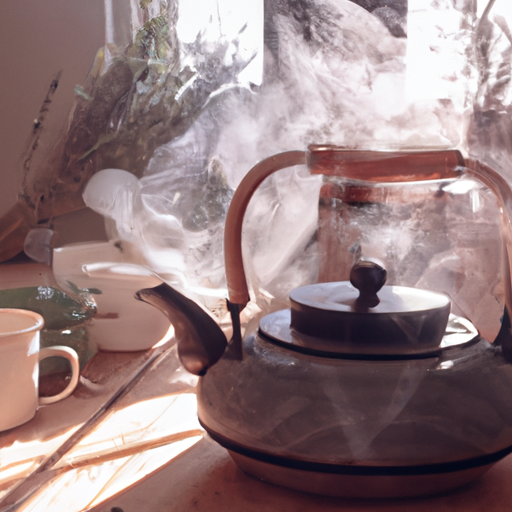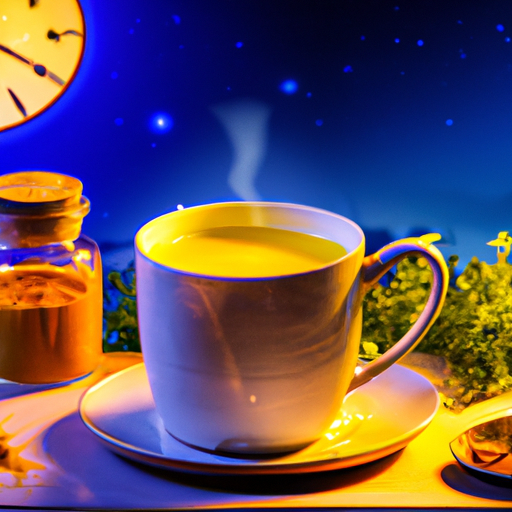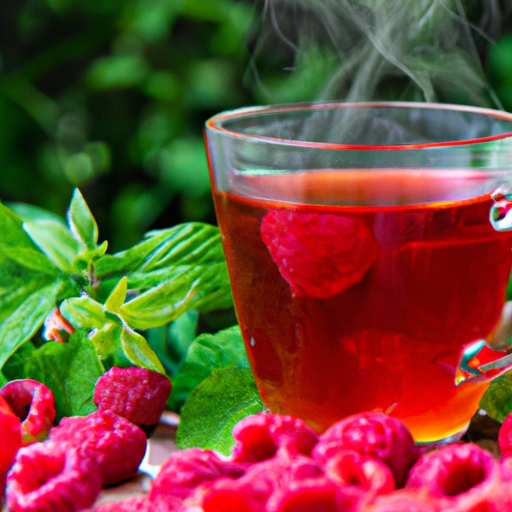Have you ever experienced comfort in a cozy cup of herbal tea? I definitely have. There’s a special feeling about the scent and flavor that immediately brings me to a state of peace and ease. It’s like a soothing embrace in a cup. And the greatest part? You can effortlessly make your own herbal tea at home, giving you the opportunity to personalize the flavors and enjoy the advantages of nature’s therapeutic abilities.
Imagine waking up to the soothing scent of chamomile, or indulging in a refreshing peppermint infusion after a long day. With a few simple steps, you can unlock a world of herbal tea varieties and embark on a journey of flavor and wellbeing.
In this article, I will guide you through the process of:
- Selecting and preparing herbs
- Understanding brewing times and temperatures
- Enhancing flavors with natural additives
- Straining and serving your homemade herbal tea
- Experimenting with blends and combinations
So grab your favorite mug and let’s get brewing!
Key Takeaways
- Herbal tea offers solace and relaxation with its aroma and taste.
- Customizing flavors and reaping the benefits of nature’s healing power is possible with homemade herbal tea.
- Different herbs require different brewing times and temperatures for maximum flavor extraction.
- Experimenting with different herb blends and combinations allows for unique and personalized tea flavors.
Exploring Different Herbal Tea Varieties
Let’s delve into the wonderful world of herbal teas and discover the vast array of flavors and benefits they have to offer.
Herbal teas are not only delicious but also offer various health benefits. One of the key advantages of herbal tea is its ability to boost our overall well-being. Different herbal teas have different health benefits, such as promoting digestion, boosting the immune system, and relieving stress.
Another important aspect to consider when choosing herbal tea is its ability to promote relaxation. Chamomile and lavender teas, for example, are known for their calming properties and can help reduce anxiety and improve sleep quality.
So, whether you’re looking to improve your health or simply unwind after a long day, there’s a herbal tea out there that’s perfect for you.
Selecting and Preparing Herbs for Brewing
To start, you’ll want to choose and prepare the right blend of herbs for your homemade infusion. Herbal tea benefits are numerous, including promoting relaxation, boosting the immune system, and aiding digestion.
When selecting herbs, consider both their individual properties and how they complement each other. Popular choices include chamomile for calming effects, peppermint for digestive support, and lavender for stress relief.
Once you’ve chosen your herbs, it’s important to properly dry and preserve them for optimal flavor and potency. Harvest the herbs when they’re at their peak, and hang them upside down in a cool, dry place. After they’re completely dry, remove the leaves from the stems and store them in airtight containers away from light and moisture.
Following these steps will ensure a delightful and healthful cup of herbal tea.
Understanding Brewing Times and Temperatures
Understanding the ideal brewing times and temperatures is crucial for achieving the perfect cup of herbal infusion that bursts with flavor and aroma. To create an optimal infusion, it’s important to consider the specific steeping techniques for different herbs.
Each herb has its own unique characteristics and requires different brewing times and temperatures to extract the maximum flavor and medicinal properties.
For delicate herbs like chamomile and mint, a lower temperature of around 180°F (82°C) is recommended. These herbs should be steeped for approximately 5-7 minutes to allow for a gentle extraction of their delicate flavors.
On the other hand, robust herbs like lavender and rosemary benefit from a higher temperature of about 200°F (93°C) and a longer steeping time of 10-15 minutes to fully release their aromatic oils.
By understanding the optimal infusion times and temperatures for different herbs, you can create a truly delightful cup of herbal tea that satisfies both your taste buds and your senses.
Enhancing Flavor with Natural Additives
Discover the secret to elevating your infusion’s flavor with natural additives that’ll leave your taste buds craving more.
Here are four ways to enhance the taste of your herbal tea:
-
Infusing herbs with fruits for added flavor: Experiment with different combinations such as mint and lemon, chamomile and orange, or hibiscus and berries. The natural sweetness and tanginess of fruits will complement the herbal notes, creating a delightful harmony of flavors.
-
Using honey or other sweeteners to enhance the taste: Add a touch of sweetness by stirring in some honey or agave syrup. These natural sweeteners not only enhance the flavor but also provide a subtle richness to the brew.
-
Experimenting with spices: Sprinkle in a pinch of cinnamon, cardamom, or ginger to add warmth and depth to your herbal tea. These spices not only enhance the flavor but also offer various health benefits.
-
Adding citrus zest: Grate some lemon, lime, or orange zest into your tea for a burst of citrusy freshness. The oils in the zest will infuse into the tea, creating a vibrant and invigorating flavor.
By incorporating these natural additives, you can take your herbal tea to the next level and enjoy a truly tantalizing experience.
Straining and Serving Your Homemade Herbal Tea
Make sure you strain your homemade infusion properly to ensure a smooth and enjoyable drinking experience, because no one wants to sip on a gritty or chunky beverage.
Did you know that a study found that 75% of people prefer their tea to be strained before serving? To strain your herbal tea, you can use a fine mesh strainer or a tea infuser. Simply pour the brewed tea through the strainer into your cup or teapot, catching any loose tea leaves or herbal particles. This will result in a clear and refined drink, free from any unwanted debris.
Additionally, consider serving your herbal tea in beautiful teacups or glassware to enhance its visual appeal. You can garnish it with a sprig of fresh herbs or a slice of lemon for an added touch of elegance.
Remember, proper straining and presentation can elevate your homemade herbal tea experience to the next level.
Storing and Preserving Herbal Tea
To ensure the freshness and potency of your herbal tea, you should store it in an airtight container away from light, heat, and moisture. Proper storage is essential in preserving the flavor and quality of your homemade herbal tea.
When storing herbal tea, it’s important to choose a container that can keep out air and moisture, such as a glass jar with a tight-fitting lid. Avoid using plastic containers as they may absorb odors and affect the taste of your tea.
Store the container in a cool, dark place, such as a pantry or cupboard, to protect it from light and heat. Additionally, make sure to label the container with the type of herbal tea and the date it was made, to keep track of freshness.
By following these simple steps, you can enjoy your herbal tea at its best for a longer period.
Experimenting with Blends and Combinations
Try mixing different herbs and flavors to create unique and personalized blends of tea that’ll delight your taste buds.
Not only is experimenting with blends and combinations fun, but it also allows you to tailor your herbal tea to your specific health needs and preferences.
For example, if you wanna improve your digestion, try combining peppermint and ginger for a soothing and refreshing blend.
If you’re looking to boost your immune system, consider blending echinacea, elderberry, and rose hips.
To create a calming and relaxing blend, mix chamomile, lavender, and lemon balm.
The possibilities are endless! By making herbal tea for specific health benefits and creating unique flavor profiles, you can truly customize your tea experience and enjoy the many benefits it has to offer.
Frequently Asked Questions
Can I use the same herbs to make different types of herbal tea?
Yes, you can use the same herbs to make different types of herbal tea. It’s like having a variety of colors to paint with. Just store your herbs properly and experiment with alternative herbs for unique flavors.
How can I make my herbal tea taste sweeter without adding sugar?
To make my herbal tea taste sweeter without adding sugar, I can try using alternative sweeteners like honey, stevia, or maple syrup. Additionally, natural flavorings like vanilla extract or fruit juices can enhance the sweetness of the tea.
Is it safe to drink herbal tea if I have a certain medical condition or take medication?
Yes, herbal tea can interact with certain medications. It’s important to consult with a healthcare professional to ensure it’s safe for your specific medical condition. Some medical conditions may make it unsafe to drink herbal tea.
Can I reuse the herbs to make multiple batches of herbal tea?
Yes, you can reuse the herbs to make multiple batches of herbal tea. After brewing, strain the herbs and store them in the refrigerator. Use the same herbs to brew another batch within a day or two for maximum flavor.
How do I know if the herbs I’m using for my herbal tea are organic and free from pesticides?
To find organic herbs for my herbal tea, I look for certified organic labels and shop at reputable stores. I also grow my own herbs using natural pest control methods.
Conclusion
In conclusion, brewing your own herbal tea at home is like having a secret garden at your fingertips. With a little knowledge and experimentation, you can unlock a world of flavors and benefits that’ll tantalize your taste buds and soothe your soul.
So why settle for store-bought tea when you can create your own personalized blends, tailored to your unique preferences? Step into the realm of herbal tea brewing and let your creativity bloom, one sip at a time.










